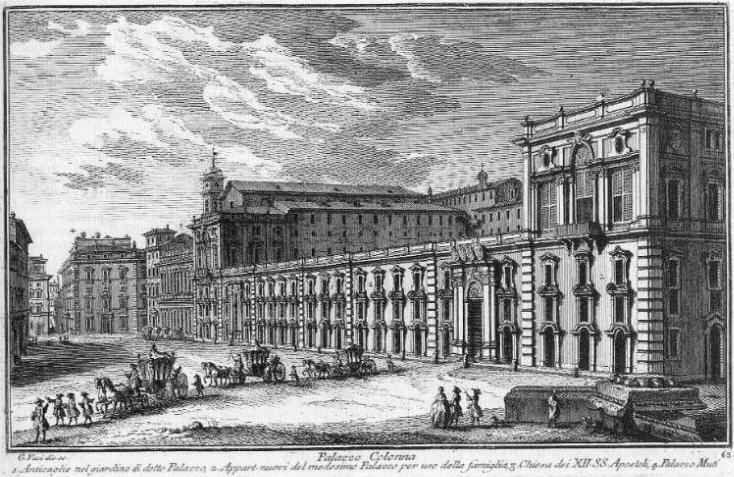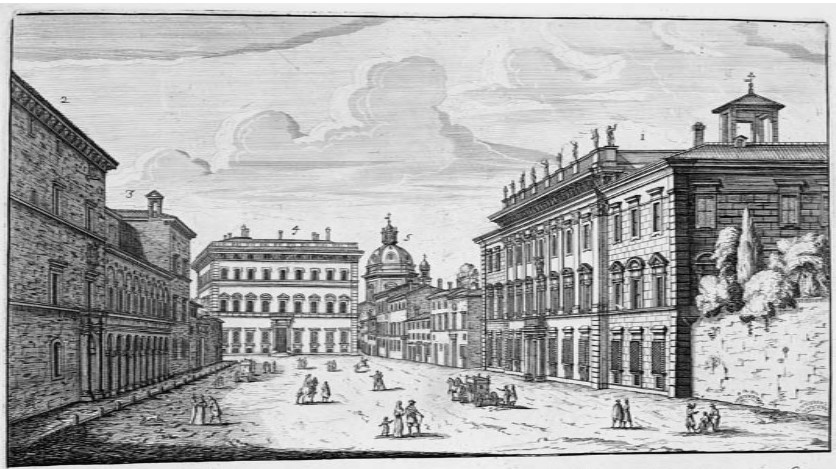|
L'empio Punito
''L'empio punito'' is an opera by composer Alessandro Melani. Notably the first opera written on the subject of Don Juan, the work uses an Italian language libretto by Giovanni Filippo Apolloni and Filippo Acciaiuoli. The opera was commissioned by Marie Mancini for performance during Carnival of 1669. The work premiered at the Teatro di Palazzo Colonna in the historic Borgo district of Rome , established_title = Founded , established_date = 753 BC , founder = King Romulus (legendary) , image_map = Map of comune of Rome (metropolitan city of Capital Rome, region Lazio, Italy).svg , map_caption ... on 17 February 1669. Roles * Atamira * Ipomene * Delfa * Niceste * Proserpina * Bibi * Atrace * Cloridoro * Tidemo * Acrimante * Corimbo * Telefo * Demonio * Caronte Recordings * DVD L'Empio Punito - Alessandro Ravasio, Michela Guarrera, Carlotta Colombo, Sabrina Cortese, Mauro Borgioni, Reate Festival Baroque Ensemble, Alessandro ... [...More Info...] [...Related Items...] OR: [Wikipedia] [Google] [Baidu] |
Marie Mancini
Anna Maria (Marie) Mancini (28 August 1639 – 8 May 1715) was the third of the five Mancini sisters; nieces to Cardinal Mazarin who were brought to France to marry advantageously. Along with two of their female Martinozzi cousins, the Mancini sisters were known at the court of King Louis XIV of France as the ''Mazarinettes''. Early life and family Mancini was born on 28 August 1639 and grew up in Rome. Her father was Baron Lorenzo Mancini, an Italian aristocrat who was also a necromancer and astrologer. After his death in 1650, her mother, Geronima Mazzarini, brought her daughters from Rome to Paris in the hope of using the influence of her brother, Cardinal Mazarin, to gain them advantageous marriages. The other Mancini sisters were: * Laure (1636 - 1657), the eldest, who married Louis de Bourbon, duc de Vendôme, the grandson of King Henry IV and his mistress, Gabrielle d'Estrées, and became the mother of the famous French general Louis Joseph de Bourbon, duc de Vend ... [...More Info...] [...Related Items...] OR: [Wikipedia] [Google] [Baidu] |
Operas
Opera is a form of theatre in which music is a fundamental component and dramatic roles are taken by singers. Such a "work" (the literal translation of the Italian word "opera") is typically a collaboration between a composer and a librettist and incorporates a number of the performing arts, such as acting, scenery, costume, and sometimes dance or ballet. The performance is typically given in an opera house, accompanied by an orchestra or smaller musical ensemble, which since the early 19th century has been led by a conductor. Although musical theatre is closely related to opera, the two are considered to be distinct from one another. Opera is a key part of the Western classical music tradition. Originally understood as an entirely sung piece, in contrast to a play with songs, opera has come to include numerous genres, including some that include spoken dialogue such as ''Singspiel'' and ''Opéra comique''. In traditional number opera, singers employ two styles of singing: ... [...More Info...] [...Related Items...] OR: [Wikipedia] [Google] [Baidu] |
Italian-language Operas
Italian (''italiano'' or ) is a Romance language of the Indo-European language family that evolved from the Vulgar Latin of the Roman Empire. Together with Sardinian, Italian is the least divergent language from Latin. Spoken by about 85 million people (2022), Italian is an official language in Italy, Switzerland (Ticino and the Grisons), San Marino, and Vatican City. It has an official minority status in western Istria (Croatia and Slovenia). Italian is also spoken by large immigrant and expatriate communities in the Americas and Australia.Ethnologue report for language code:ita (Italy) – Gordon, Raymond G., Jr. (ed.), 2005. Ethnologue: Languages of the World, Fifteenth edition. Dallas, Tex.: SIL International. Online version Italian ... [...More Info...] [...Related Items...] OR: [Wikipedia] [Google] [Baidu] |
Operas By Alessandro Melani
Opera is a form of theatre in which music is a fundamental component and dramatic roles are taken by Singing, singers. Such a "work" (the literal translation of the Italian word "opera") is typically a collaboration between a composer and a libretto, librettist and incorporates a number of the performing arts, such as acting, Theatrical scenery, scenery, costume, and sometimes dance or ballet. The performance is typically given in an opera house, accompanied by an orchestra or smaller musical ensemble, which since the early 19th century has been led by a conducting, conductor. Although musical theatre is closely related to opera, the two are considered to be distinct from one another. Opera is a key part of the Western culture#Music, Western classical music tradition. Originally understood as an entirely sung piece, in contrast to a play with songs, opera has come to include :Opera genres, numerous genres, including some that include spoken dialogue such as ''Singspiel'' and ... [...More Info...] [...Related Items...] OR: [Wikipedia] [Google] [Baidu] |
Rome
, established_title = Founded , established_date = 753 BC , founder = King Romulus (legendary) , image_map = Map of comune of Rome (metropolitan city of Capital Rome, region Lazio, Italy).svg , map_caption = The territory of the ''comune'' (''Roma Capitale'', in red) inside the Metropolitan City of Rome (''Città Metropolitana di Roma'', in yellow). The white spot in the centre is Vatican City. , pushpin_map = Italy#Europe , pushpin_map_caption = Location within Italy##Location within Europe , pushpin_relief = yes , coordinates = , coor_pinpoint = , subdivision_type = Country , subdivision_name = Italy , subdivision_type2 = Region , subdivision_name2 = Lazio , subdivision_type3 = Metropolitan city , subdivision_name3 = Rome Capital , government_footnotes= , government_type = Strong Mayor–Council , leader_title2 = Legislature , leader_name2 = Capitoline Assemb ... [...More Info...] [...Related Items...] OR: [Wikipedia] [Google] [Baidu] |
Borgo (rione Of Rome)
Borgo (sometimes called also I Borghi) is the 14th ''Rioni of Rome, rione'' of Rome, Italy. It is identified by the initials R. XIV and is included within Municipio I. Its coat of arms shows a lion (after the name "Leonine City", which was also given to the district), lying in front of three mounts and a star. These – together with a Heraldry, lion rampant – are also part of the coat of arms of Pope Sixtus V, who annexed Borgo as the 14th rione of Rome. History Roman Age: ''Ager Vaticanus'' During the Roman age, the Borgo district was part of the 14th 14 regions of the Augustan Rome, Regio (Regio XIV Transtiberim) and was named ''Ager Vaticanus'', after the auguries (''vaticinii'') performed there by the Etruscan civilisation, Etruscan ''Augurs''. Since it lay outside the Pomerium (the religious city border inside which burial was forbidden) and was plagued by malaria, this territory was used as a burial place. Some tombs reached notable proportions, including the ''Terebinth ... [...More Info...] [...Related Items...] OR: [Wikipedia] [Google] [Baidu] |
Palazzo Colonna
The Palazzo Colonna () is a palatial block of buildings in central Rome, Italy, at the base of the Quirinal Hill, and adjacent to the church of Santi Apostoli. It is built in part over the ruins of an old Roman serapeum, and it has belonged to the prominent Colonna family for over twenty generations. History The first part of the palace dates from the 13th century, and tradition holds that the building hosted Dante during his visit to Rome. The first documentary mention notes that the property hosted Cardinals Giovanni and Giacomo Colonna in the 13th century. It was also home to Cardinal Oddone Colonna before he ascended to the papacy as Pope Martin V in 1417. With his passing, the palace was sacked during feuds, and the main property passed into the hands of the Della Rovere family. It returned to the Colonna family when Marcantonio I Colonna married Lucrezia Gara Franciotti Della Rovere, the niece of Pope Julius II. The Colonna family's alliance to the Habsburg power likely ... [...More Info...] [...Related Items...] OR: [Wikipedia] [Google] [Baidu] |
Carnival
Carnival is a Catholic Christian festive season that occurs before the liturgical season of Lent. The main events typically occur during February or early March, during the period historically known as Shrovetide (or Pre-Lent). Carnival typically involves public celebrations, including events such as parades, public street parties and other entertainments, combining some elements of a circus. Elaborate costumes and masks allow people to set aside their everyday individuality and experience a heightened sense of social unity.Bakhtin, Mikhail. 1984. ''Rabelais and his world''. Translated by H. Iswolsky. Bloomington: Indiana University Press. Original edition, ''Tvorchestvo Fransua Rable i narodnaia kul'tura srednevekov'ia i Renessansa'', 1965. Participants often indulge in excessive consumption of alcohol, meat, and other foods that will be forgone during upcoming Lent. Traditionally, butter, milk, and other animal products were not consumed "excessively", rather, their stoc ... [...More Info...] [...Related Items...] OR: [Wikipedia] [Google] [Baidu] |
Filippo Acciaiuoli
Filippo Acciaiuoli (1637 – 8 February 1700) was an Italian composer, librettist, theater manager, machine designer, and poet. Acciaiuoli spent much of his youth and early adulthood traveling throughout Europe, the Middle East and Northern Africa. After returning to Rome in his early twenties, he initially studied mathematics at a seminary in Rome but ultimately became interested in theater. He is best known for his work as a librettist for operas such as Jacopo Melani's '' Girello'', which premiered in Rome in 1668, and as the inventor of numerous sophisticated machines that were used in theatrical productions of the day. He also composed one opera, ''Chi è cagion del suo mal pianga se stesso'', which premiered in Rome in 1682. Acciaiuoli was the first business manager of the Teatro Tordinona in Rome and later the manager of the Teatro Capranica. He was also a member of ''l'Academia degli Immobili'' when Ferdinando Tacca developed its Teatro della Pergola. He had a close asso ... [...More Info...] [...Related Items...] OR: [Wikipedia] [Google] [Baidu] |
Opera
Opera is a form of theatre in which music is a fundamental component and dramatic roles are taken by singers. Such a "work" (the literal translation of the Italian word "opera") is typically a collaboration between a composer and a librettist and incorporates a number of the performing arts, such as acting, scenery, costume, and sometimes dance or ballet. The performance is typically given in an opera house, accompanied by an orchestra or smaller musical ensemble, which since the early 19th century has been led by a conductor. Although musical theatre is closely related to opera, the two are considered to be distinct from one another. Opera is a key part of the Western classical music tradition. Originally understood as an entirely sung piece, in contrast to a play with songs, opera has come to include numerous genres, including some that include spoken dialogue such as '' Singspiel'' and '' Opéra comique''. In traditional number opera, singers employ two styles of ... [...More Info...] [...Related Items...] OR: [Wikipedia] [Google] [Baidu] |
Giovanni Filippo Apolloni
Giovanni Filippo Apolloni (1620 – 15 May 1688) was an Italian poet and librettist. Born in Arezzo, he has sometimes been referred to as "Giovanni Apollonio Apolloni", but the second given name is spurious.Walker, Thomas (2001)"Apolloni, Giovanni Filippo" Grove Music Online. Retrieved 21 June 2016 (subscription required for full access). He served as the court poet to Ferdinand Charles, Archduke of Austria at Innsbruck form 1653 until 1659. On his return to Italy he entered the service of Cardinal Volumnio Bandinelli. After Bandinelli's death in 1667 Appolloni was in the service of the Chigi family in Rome and Siena for the rest of his life. He wrote the librettos for a number of operas, the most well-known of which were Antonio Cesti's '' L'Argia'' and '' La Dori'', as well as several oratorios and the texts for cantatas by both Cesti and Alessandro Stradella. Biography Apolloni was born in Arezzo to a family prominent in the city's history. Little is known about his earl ... [...More Info...] [...Related Items...] OR: [Wikipedia] [Google] [Baidu] |
.png)







